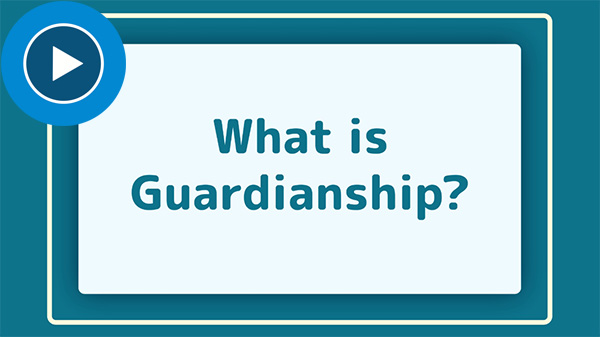
What Is Guardianship Video | Transcript
Guardianship gives a person or organization the legal right to make certain decisions for another person. Guardianship requires going to court and only a judge can appoint a guardian.
A person may need a guardian if they are unable to make decisions, manage their affairs, and are at risk of harm because of serious illness, disability, dementia, or other conditions that impacts their ability to think and act clearly.
In New York State there are three types of guardianship:
- Article 81 Guardianship: Also known as guardianship for incapacitated adults (18+). This type of guardianship asks a judge to give a guardian only the powers necessary to meet an incapacitated person’s needs. This may include powers to manage a person’s finances and property, personal needs, or both. This webpage focuses on Article 81 Guardianship.
- Article 17-A Guardianship: This type of guardianship is for adults (18+) with an intellectual or developmental disability who need a guardian. It comes from Article 17-A of the Surrogate’s Court Procedure Act. It gives the guardian the power to make all decisions, unlike Article 81 which tailors powers to the person's specific needs. Note that Article 81 guardianship is also available for people with intellectual and developmental disabilities. For more information on 17-A Guardianship, go to Court Help: Guardianship of an Intellectually or Developmentally Disabled Adult
- Guardianship of a Child: A parent or other person can request the court grant them guardianship of a child when there is concern that one or both parents are unable to care for the child. Visit Court Help: Guardianship of a Child.
Article 81 Guardianship
See the Article 81 Guardianship Glossary.for definitions of terms used in guardianship proceedings.
In order to appoint a guardian, the court must find that a person is:- Unable to meet some or all of their personal and/or financial needs; and is
- Incapable of making reasonable decisions; and is
- At risk of harm because they do not recognize that they need help.
See Section 81.02 of the Mental Hygiene Law for complete legal requirements
Guardianship limits a person’s ability to make some decisions for themselves. A judge will want to see that all other available tools and services have been considered before appointing a guardian. See Family, Friend, and Caregiver Resources and Alternatives to Guardianship
Who can be a guardian?
To be a guardian, you must be at least 18 years old. A guardian may be a family member or a friend, but if there is no appropriate friend or family member available, the judge may select a qualified person or non-profit organization.
Note: Even if a certain person is nominated to be guardian, the judge can decide to appoint someone else they think is more appropriate.
Decision-making powers of a guardian
The court will decide if a guardian should be appointed to make decisions about personal needs, finances and property, or both. The types of decisions a guardian can make are known as powers. A person with a guardian still has any decision-making ability not specifically given to their guardian.
- Personal needs powers: Examples of personal needs powers a court may grant to a guardian can be found in Section 81.22 of the Mental Hygiene Law. These include choosing a safe place to live, deciding who will provide care, and making medical decisions.
- Property needs powers: Examples of property needs powers a court may grant to a guardian can be found in Section 81.21 of the Mental Hygiene Law. These include paying bills, managing income and assets, and entering into contracts.
Limitations of guardianship: Medical, Mental Health, and Drug Treatment
There are some things a guardian can never do. A guardian cannot consent to mental health or drug treatment or other medications over a person’s objection. They also cannot admit a person into a mental health facility or treatment program.
If it is believed that a person needs involuntary mental health treatment, there are certain processes available including Assisted outpatient treatment (AOT) and Court Ordered Involuntary Hospitalization. You can find out more about this at Alternatives to Guardianship.
Length of a Guardianship
Article 81 guardianship is meant to last only as long as it is necessary. Many guardianships last for the rest of a person’s life, but if it is no longer needed, the court should be notified. You can find more at Ending or Changing Guardianship.
General Responsibilities of a guardian
Once an Article 81 guardian is appointed, the judge will sign a form called an Order and Judgment. The Order and Judgement will explain, in detail, the duties and responsibilities of the guardian. This includes drafting and filing initial and annual reports. Once appointed, guardians must finish a process called qualification before they can start their duties. This includes filing documents with the clerk’s office and taking an educational course. A judge may order the guardian to obtain a bond. A bond is like an insurance policy that protects the person against any errors made by the guardian.
* You can find information about training and support programs for appointed guardians at Information for Appointed Guardians
Details about the Article 81 Guardianship Court Process
You can find more details about the Article 81 Court Process atBecoming a Guardian (Court Process)
This website is supported by the Administration for Community Living (ACL), U.S. Department of Health and Human Services (HHS) as part of a financial assistance award totaling $1,000,000 with 100 percent funding by ACL/HHS. The contents are those of the author(s) and do not necessarily represent the official views of, nor an endorsement, by ACL/HHS, or the U.S. Government.